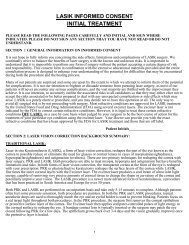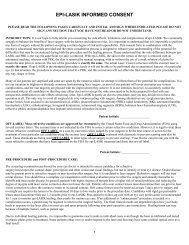lasik informed consent - initial - Braverman Eye Center
lasik informed consent - initial - Braverman Eye Center
lasik informed consent - initial - Braverman Eye Center
You also want an ePaper? Increase the reach of your titles
YUMPU automatically turns print PDFs into web optimized ePapers that Google loves.
SECTION 3: LASIK INDICATIONS, CONTRAINDICATIONS and PERI-OPERATIVE CARE<br />
. LASIK is indicated for the treatment of myopia (nearsightedness), hyperopia (farsightedness) and astigmatism.<br />
. Candidates must be over 18-21 years of age depending upon the laser used.<br />
. Candidates must have a stable refraction with no more than 0.50 diopter change within the previous year as the<br />
procedure will not change the natural growth or aging of the eye<br />
. Candidates must be aware that this is an elective procedure and that there are alternative forms of vision correction<br />
that are both non-surgical and surgical including eyeglasses, contact lenses, orthokeratology (OK), radial<br />
keratotomy(RK), intracorneal ring segments (ICRS), automated lamellar keratoplasty(ALK), laser thermokeratoplasty<br />
(L TK), refractive phakic lens implants, laser assisted sub-epithelial keratomileusis(LASEK), photorefractive<br />
keratectomy (PRK) or Epi-LASIK.<br />
. Candidates must be free of certain eye diseases including keratoconus, glaucoma, cataracts, retinal and optic nerve<br />
diseases. Corneal ectasia is a steepening of the cornea that can worsen with time and can lead to a reduction in visual<br />
acuity. In some cases, ectasia may be associated with keratoconus or related corneal disorder. Keratoconus is a<br />
relatively rare degenerative corneal disease affecting vision that occurs in approximately 1/2000 in the general<br />
population. While there are several tests that suggest which patients might be at risk, very rarely this condition<br />
can develop in patients who have normal preoperative topography (a map of the cornea obtained before<br />
surgery) and pachymetry (corneal thickness measurement) testing. Since keratoconus and related disorders may<br />
occur naturally, there is no absolute test that will ensure a patient will not develop ectasia following laser vision<br />
correction. Severe ectasia may need to be treated with a corneal transplant while mild ectasia can be corrected by<br />
glasses, contact lenses, intacs or collagen cross linking.<br />
. Candidates must be free of certain eye viruses including herpes simplex and herpes zoster<br />
. Candidates must be free of certain health problems including uncontrolled diabetes, autoimmune vascular disease, any<br />
medication or condition which renders the patient immunocompromised<br />
. Candidates must make their surgeon aware of certain eye problems including amblyopia (lazy eye), strabismus<br />
(muscle imbalance), dry eyes, or any recurrent, residual or active eye condition which may affect healing .<br />
. Candidates must make their surgeon aware of certain general health conditions including keloid scarring with<br />
previous surgical healing, back problems, claustrophobia or other psychological problems, which may affect the<br />
surgery or recovery<br />
. Candidates must make their surgeon aware of any implants including a cardiac pacemaker, insulin implant or any<br />
other electronic implanted device<br />
. Patients must also make their surgeon aware of any medication allergies and any medications they are taking to avoid<br />
potential drug interactions and allergic reactions<br />
. The FDA considers pregnancy and nursing contraindications, although their affects on LASIK have not been studied.<br />
Female patients agree to disclose to their surgeon if they are pregnant, breast feeding, could potentially be pregnant or<br />
plan to become pregnant within the next 6 months.<br />
Patient Initials__________________<br />
PRE-PROCEDURE and POST-PROCEDURE CARE:<br />
The screening examination performed by your eye doctor is intended to assess candidacy for refractive surgery based<br />
upon the corneal shape, prescription and other ocular and visual findings, but not to identify or treat eye disease. Ocular<br />
disease may be present prior to refractive surgery or may develop after surgery, but it is unrelated to laser surgery.<br />
Refractive surgery will not treat ocular disease. You should have a complete eye examination with retinal evaluation<br />
prior to refractive surgery and annually thereafter to identify and treat ocular disease. In general, patients with higher<br />
degrees of myopia have a higher risk of retinal problem and reducing the degree of myopia with laser vision correction<br />
does not lower the risk. Patients who wear contact lenses must discontinue their use prior to laser vision correction to<br />
allow the cornea to return to its natural contour.<br />
3






